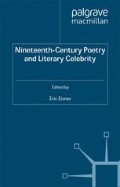Abstract
The publication of the first two cantos of Childe Harold’s Pilgrimage on 10 March 1812 notoriously sparked a sensation. Even before the poem was officially offered to the public, advance copies stirred excitement about the dashing young noble freshly returned from his exotic travels.1 As Byron’s friend Thomas Moore recalled (or re-imagined) the scene from a vantage point almost two decades later, Byron’s effect on British audiences had been immediately “electric”: “young Byron stood forth alone, unanswered by either praise or promise—the representative of an ancient house, whose name, long lost in the gloomy solitudes of Newstead, seemed to have just awakened from the sleep of half a century in his person.”2 Despite the campy, B-movie Gothicism, Moore is astute in observing that this figure exotically out of time had arrived perfectly on time to take advantage of the modern “taste for strong excitement” in a public captivated and fatigued by Napoleon. After the first edition of 500 copies of Childe Harold sold out in a mere three days, fan letters began pouring in from readers who had fallen hard for the writer whose own sensibility they imagined they recognized in the fashionably melancholic Harold. Byron found himself the darling of Whig high society, “the only topic almost of conversation—the men jealous of him, the women of each other,” as the Duchess of Devonshire informed her son overseas.3
Access this chapter
Tax calculation will be finalised at checkout
Purchases are for personal use only
Preview
Unable to display preview. Download preview PDF.
Notes
Quoted in Leslie A. Marchand, Byron: A Biography, 3 Vols (New York: Knopf, 1957), p. 335.
Mary Darby Robinson, Memoirs of the Late Mrs. Robinson (London: R. Phillips, 1801), pp. 178–9.
For a typical instance, see the fan letter from a young girl, Isabella Harvey, who wrote to Byron in 1823 under the assumed name Zorina Handley (Byron wrote back): Peter Quennell and George Paston, To Lord Byron: Feminine Profiles Based on Unpublished Letters 1807–1824 (London: John Murray, 1937), pp. 261–2.
Jerome Christensen, Lord Byron’s Strength: Romantic Writing and Commercial Society (Baltimore: Johns Hopkins UP, 1993), p. xvi.
David Erdman, “‘Fare Thee Well!’—Byron’s Last Days in England,” in Shelley and His Circle, 1773–1822, ed. Kenneth Neil Cameron (Cambridge, MA: Harvard UP, 1961-), IV, 638–55
John Murray, Letters of John Murray to Lord Byron, ed. Andrew Nicholson (Liverpool: Liverpool UP, 2007), p. 162.
Quoted in Malcolm Elwin, Lord Byron’s Wife (New York: Harcourt Brace, 1962), p. 394.
[Mary Cockle], Lines Addressed to Lady Byron (Newcastle: Printed by S. Hodgson, 1817), p. 1
Byron, Ode to Napoleon Buonaparte (London: John Murray, 1814).
[John Gibson Lockhart?], “Remarks on Don Juan,” Blackwood’s Magazine 5 (August 1819) 512–18
Caroline Franklin, Byron’s Heroines (Oxford: Clarendon Press, 1992), p. 101.
See Peter W. Graham, Don Juan and Regency England (Charlottesville: UP Virginia, 1990), p. 163.
Copyright information
© 2009 Eric Eisner
About this chapter
Cite this chapter
Eisner, E. (2009). Systems of Literary Lionism. In: Nineteenth-Century Poetry and Literary Celebrity. Palgrave Macmillan, London. https://doi.org/10.1057/9780230250840_2
Download citation
DOI: https://doi.org/10.1057/9780230250840_2
Publisher Name: Palgrave Macmillan, London
Print ISBN: 978-1-349-31001-2
Online ISBN: 978-0-230-25084-0
eBook Packages: Palgrave Literature & Performing Arts CollectionLiterature, Cultural and Media Studies (R0)

